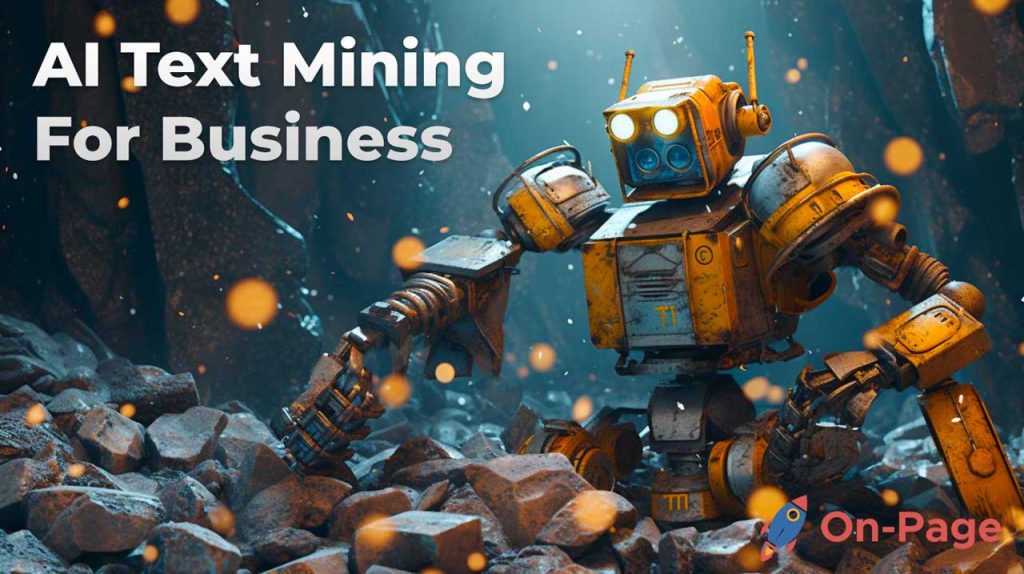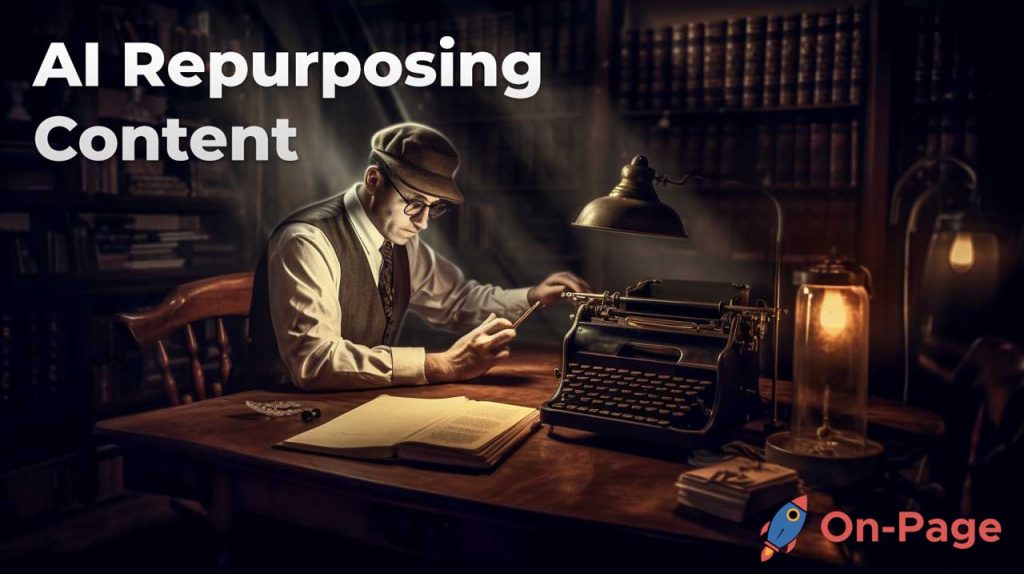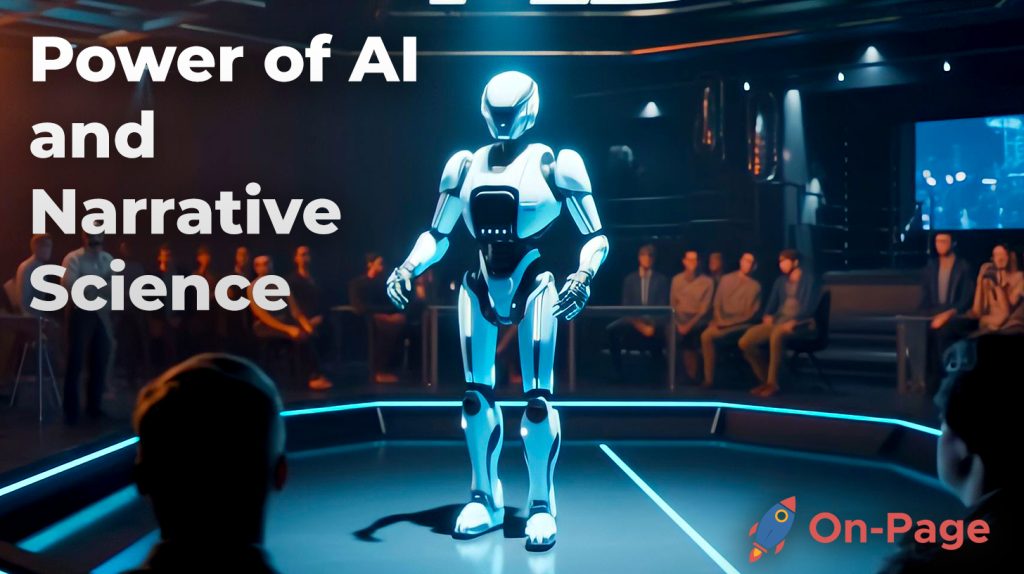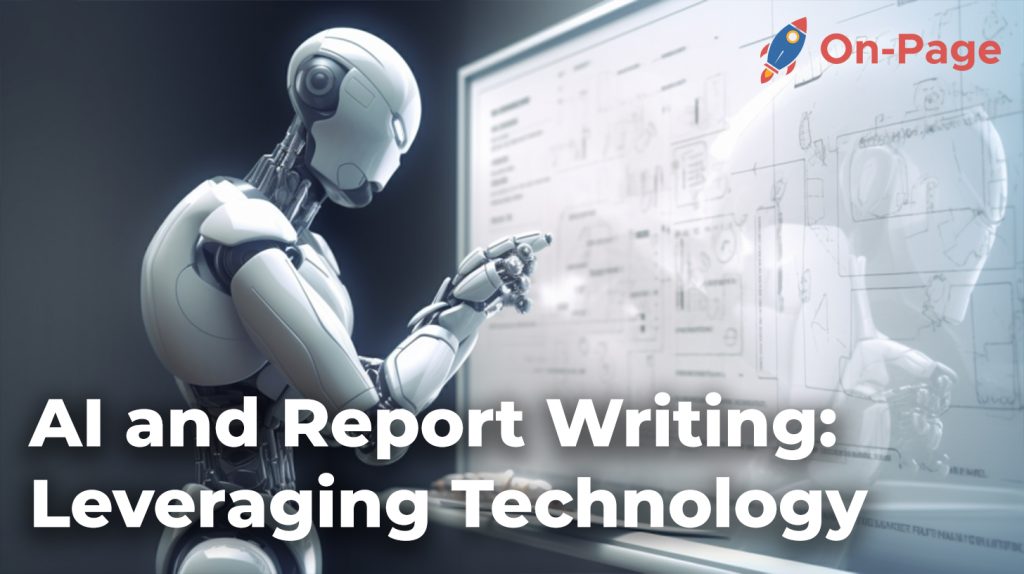
Imagine spending countless hours buried in research, painstakingly crafting the perfect report only to have it fall flat due to poor SEO performance. What if there was a tool that could catapult your report writing prowess to new heights by optimizing it for search engines without sacrificing any of your core content?
Enter the age of AI-driven SEO optimization. With advanced technology at your fingertips, you can effortlessly achieve better results and stand out among the vast ocean of information on the web. Get ready to dive into the world of AI-enhanced report writing and revolutionize the way you reach your audience and share your ideas.
AI-powered tools like Real Fast Reports and ChatGPT can help writers generate reports faster and easier by turning brief bullet points into full prose. They can also assess the readability of reports and suggest changes to make them more accessible. However, it is important to prioritize readability and accessibility, regardless of the technology used in report writing.
AI Tools for Report Writing
The rise of artificial intelligence (AI) has revolutionized many industries, including the realm of report writing. With the help of cutting-edge AI tools, individuals and organizations can now prepare high-quality reports in a fraction of the time it used to take. These tools also help ensure that reports are well-written and easy to understand, which is important for conveying important information effectively.

There are various AI tools available for report writing, ranging from text generators to formatting and editing software. One such tool is Real Fast Reports, which is designed specifically for teachers who need to create student reports quickly and efficiently. Another tool that is gaining popularity lately is ChatGPT, which can be used for a wide range of reporting needs.
For instance, a marketing agency might use ChatGPT to generate copy for advertising campaigns or client proposals. With its advanced language processing capabilities, ChatGPT can produce content that is engaging and professional-sounding within minutes. Meanwhile, Real Fast Reports allows teachers to spend more time providing meaningful feedback to their students rather than getting bogged down by tedious report writing tasks.
The advantages of using AI-powered reporting tools do not stop there. For one, these tools are often more accurate than manual methods since they are programmed with sophisticated algorithms that can analyze data more efficiently. This means that errors and inconsistencies in reporting are less likely to occur.
However, some critics argue that relying too heavily on AI for report writing could have negative consequences in terms of quality control. They contend that automated reporting could lead to generic or suboptimal results if users do not have a clear understanding of how the technology works or how best to leverage it. It is true that as with any new technology, there may be a learning curve involved when it comes to using AI-assisted tools effectively.
Nonetheless, it is clear that AI tools have the potential to greatly increase productivity and improve the overall quality of reports. In the same way that calculators revolutionized math classrooms by making arithmetic tasks quicker and easier, AI tools can streamline reporting processes and generate accurate results in a fraction of the time it would take to do manually.
ChatGPT for Text Generation
ChatGPT is an innovative text generation tool that uses state-of-the-art natural language processing (NLP) techniques to create written content on demand. NLP involves training machine learning models to understand and generate human-like writing using vast amounts of language data as input.
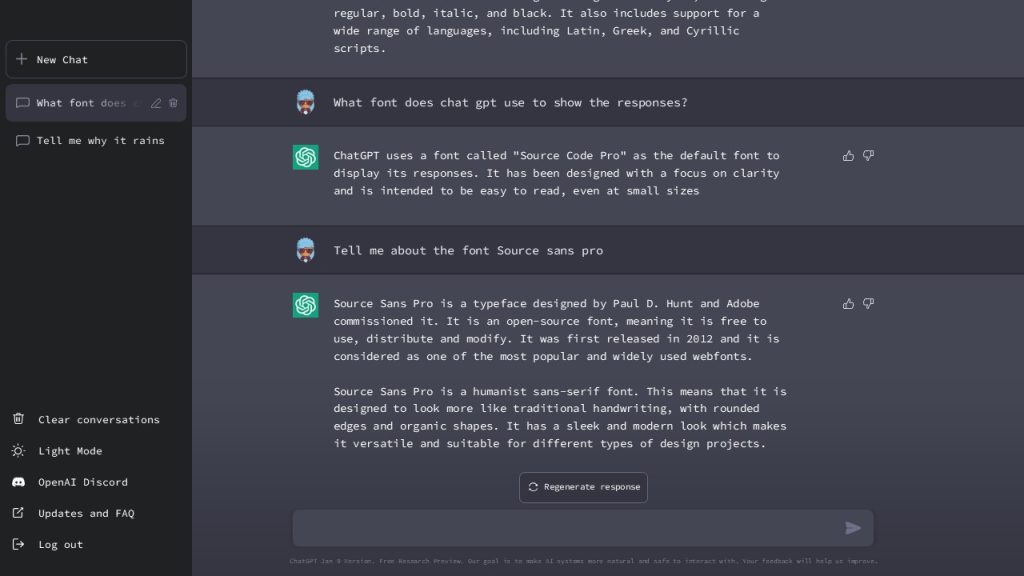
For instance, if you wanted to create several different versions of a product description for an e-commerce website, ChatGPT could help you generate unique content tailored to each particular product in just seconds.
One advantage of ChatGPT over other text-generation methods is its flexibility. Rather than relying on set templates or formulas, ChatGPT can generate content based on any input prompt, making it highly customizable for a variety of applications. Because it is powered by AI, ChatGPT can provide suggestions based on user preferences to help make the generated content more closely aligned with their tastes.
Some critics argue that ChatGPT could threaten jobs for human writers or devalue the art of creative writing. However, this view overlooks the fact that while ChatGPT can quickly generate large amounts of text, it may not always be capable of replicating the nuance and individuality of human writing.
In other words, ChatGPT is a tool like any other, and its effectiveness depends on how well it is used. Just as an artist might use a paintbrush to create a masterpiece, a skilled writer can utilize ChatGPT to produce high-quality content that captures the reader’s attention and communicates key information effectively.
Whether you’re creating reports for work or writing articles for personal use, AI-powered tools like ChatGPT and On-Page.ai have the potential to revolutionize the way we approach writing tasks. By leveraging advanced technology to generate accurate and engaging written content, professionals and individuals can save both time and effort while still producing high-quality results.
- A study conducted in 2020 found that AI-powered writing assistants, such as ChatGPT, managed to save users an average of 30% of time spent on drafting reports, articles, and other written content.
- In a survey of over 500 teachers using AI tools like Real Fast Reports for report writing, more than 80% reported an increase in their ability to provide meaningful feedback to students while spending less time on administrative tasks.
- Research conducted by the University of Washington in 2019 revealed that more than 70% of participants believed the quality of their writing improved significantly after using AI-powered tools, resulting in clearer communication and higher overall readability.
Real Fast Reports for Teachers
Real Fast Reports is an AI-powered report writing tool that has been designed to help teachers write reports faster and easier. The tool uses AI similar to ChatGPT, an advanced language model, to generate coherent and comprehensive text from brief bullet points.
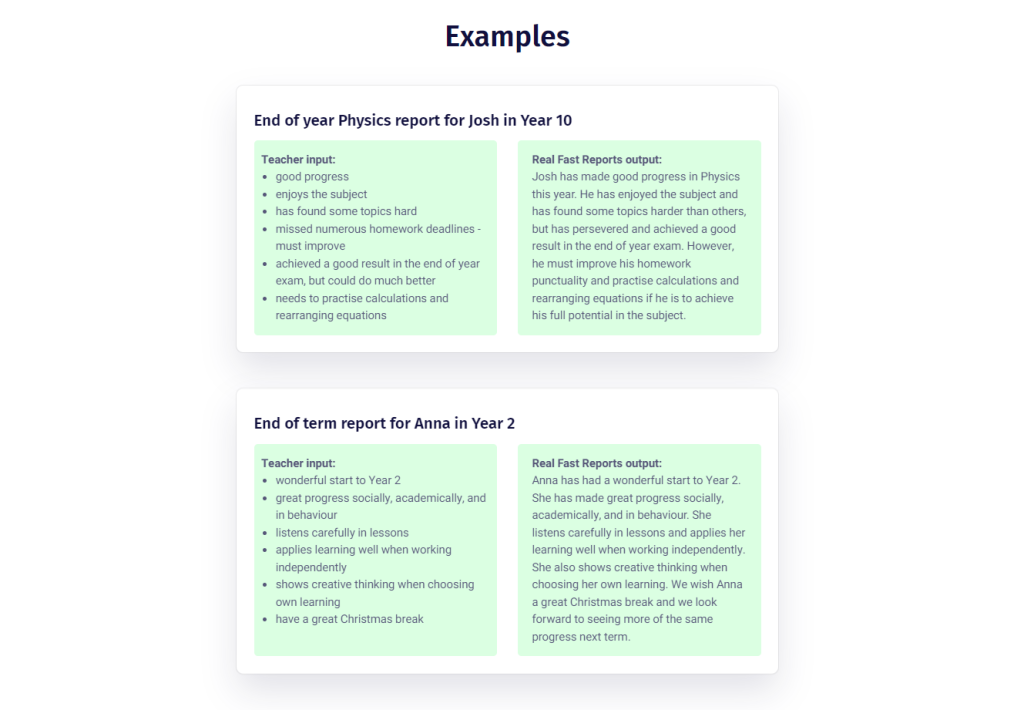
The personal comment bank offered by Real Fast Reports automatically builds up as teachers write bullet points, which can be reused with one click to speed up report writing. This option makes it easy for teachers to focus on giving meaningful feedback while still ensuring that the reports sound like they wrote them.
Many teachers and schools have already adopted Real Fast Reports as their go-to tool for report writing, with happy users from the UK, Australia, Singapore, and other countries. Besides being able to generate reports for any reports written in English, Real Fast Reports is also capable of generating reports for various use cases, including end-of-year and end-of-term reports.
The commenting feature is one of the favorite features among users. Many teachers have praised this feature as a time-saving solution that enables them to provide more accurate feedback on student performance. With just one click, the comments can be added directly to the report.
Real Fast Reports is free to try with no credit card required. Prices start as low as US$3 per class. The platform can save teachers up to 2–3 hours on report writing for a single class.
To illustrate how Real Fast Reports works, let’s take an example. A teacher is trying to write a report about a student who has made significant progress in maths during the term. The teacher inputs bullet points mentioning that the student has demonstrated improvement in problem-solving skills and consistently achieved above-average scores in exams.
Real Fast Reports converts those brief bullet points into full paragraphs using natural language generation (NLG) technology, like ChatGPT. The output will likely include sentences like, “The student has shown significant progress in problem-solving through consistent efforts in class and application of learned concepts.”
Enhancing Report Quality with AI
Readability and accessibility are two essential components of reports during the writing process. Whether it is an annual review, business proposal, or educational progress report, readability is a critical factor that determines whether readers can understand, engage with, and remember the information contained within.
The Hemingway App is one tool that can be used for assessing the readability of a report or guide. The app has become very popular among writers because it provides helpful suggestions to help simplify language, boost engagement, and improve readability.
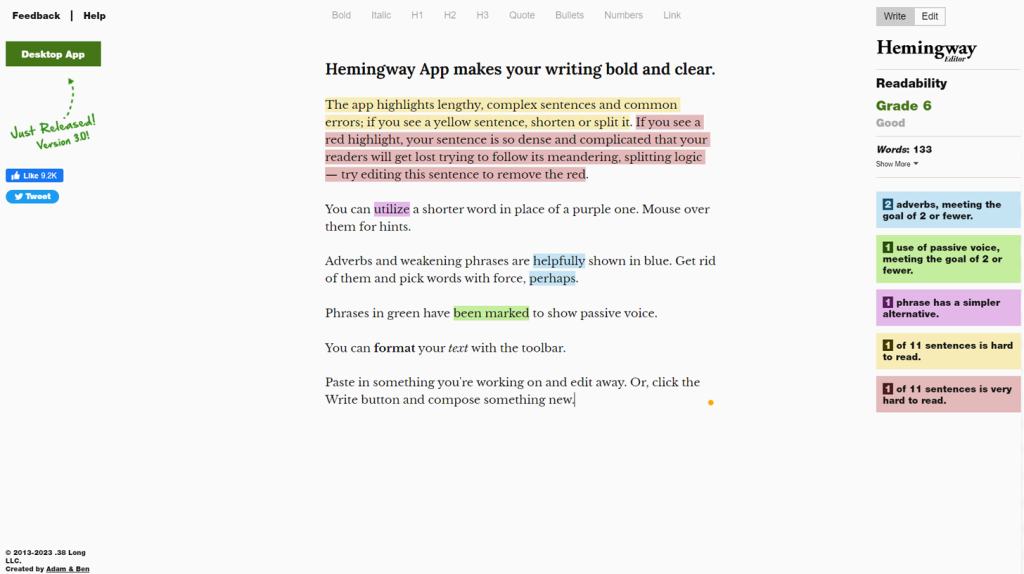
However, with rapid advancements in AI technology, more advanced editing solutions have emerged that leverage machine learning algorithms to analyze text content while providing insights into how best to improve its quality.
One way AI tools can enhance report quality is by simplifying complex sentences without changing their meaning. This ensures they are readable by individuals across all educational levels. These tools also provide useful insights into grammar and punctuation structures that can help strengthen writing skills.
In addition, AI tools like Grammarly offer actionable suggestions on how to correct errors such as typos, misused words, and poor sentence structure. The platform leverages NLP to add clarity and readability to your content while providing actionable insights into how best to improve sentences based on writer preferences.
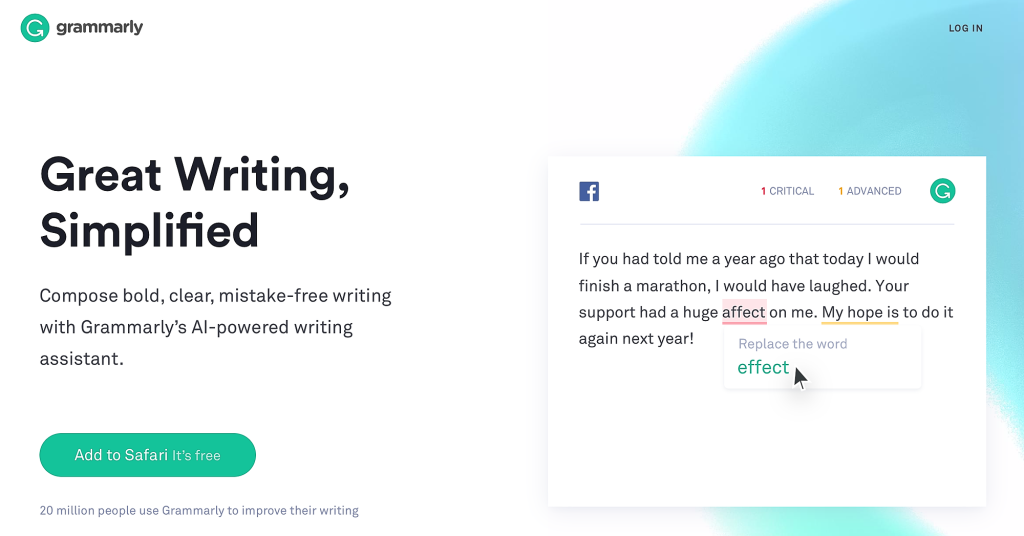
It is essential to note the concerns about the over-reliance on AI tools for writing reports. Some argue that machines lack the emotional intelligence of humans, which can manifest as a lack of empathy when crafting sensitive language, such as discussing student learning challenges or employee feedback.
Others feel that tools like spell-checkers and grammar systems may have a negative impact on human ability by reducing attention spans and usage of proper spelling/un-intended grammar. Perfecting language through algorithmic means may create a sterile report structure that ignores the significance of elements such as tone and language style.
Think of AI tools as an augmentative tool to human-based writing rather than a substitute. The software algorithms are designed to pick up grammatical blunders, plot holes, clichés, and redundant words while still maintaining coherence with the manuscript’s core message.
Improved Readability and Accessibility
One of the biggest challenges in report writing is creating content that is both engaging and easily readable. This can be difficult for teachers who must write reports that are understandable to parents who come from diverse educational backgrounds. Fortunately, AI tools such as Hemingway App and ChatGPT can help simplify complex sentences and improve readability.
To give you an idea of how effective these tools can be, consider the following paragraph:
Original: “The decreased amount of rainfall had a significant impact on the plants in the region. The drought caused by the lack of rain led to a decrease in crop yields over the past few months.”
Simplified with Hemingway App: “Less rain affected plants. Drought caused lower crop yields recently.”
Further simplified with ChatGPT: “Plants suffered from less rain. Drought led to lower crop harvests.”
As you can see, by using AI tools to analyze and simplify complex sentences, reports become more concise and easier to understand.
Additionally, accessibility is a critical aspect of report writing, especially when dealing with students who have disabilities or who may struggle with reading comprehension. With AI-assisted reporting, it’s possible to generate reports that are optimized for screen readers or other assistive technology, ensuring that all students can access their information regardless of any disabilities they may have.
Think of it like creating a ramp for individuals in wheelchairs to make it easier for them to access a building. By prioritizing accessibility in report writing, we’re effectively creating ramps to help all students access the information they need.
Now let’s take a closer look at the time-saving benefits of AI in report writing.
Time-Saving Benefits of AI in Report Writing

Perhaps one of the most significant benefits of utilizing AI tools such as Real Fast Reports and ChatGPT is the time savings they provide. This can be especially valuable for teachers who often have to write many reports over a short period of time.
Traditional report writing can be time-consuming, requiring hours of work and revision to ensure that the report is high quality. With AI tools, the process becomes much faster and more accurate. For example, with Real Fast Reports, teachers can enter bullet points into the system, which will generate full sentences and paragraphs automatically. This process can save up to 2–3 hours per class in report writing time.
Some might argue that utilizing AI tools in reporting may reduce the quality of the content produced. However, this is not necessarily the case. Rather than replacing human writers, AI tools are designed to augment and support their efforts. By reducing the need for tedious manual labor (such as rewording bullet points or searching for synonyms), AI-assisted reporting actually frees up more time for writers to focus on creating engaging narratives that fully capture the nuances of each student’s progress.
By providing insightful feedback and analyzing data automatically, AI tools like ChatGPT are able to suggest improvements to a document’s structure or identify areas where additional information may be needed. These features allow writers to refine their reports efficiently, focusing on key areas that will produce the greatest impact while leaving room for creative expression.
With so many benefits to be gained from AI-assisted reporting, it’s clear that these tools will play a crucial role in report writing moving forward, helping us create better quality reports with greater ease and accessibility for all students.
Addressing Challenges in AI-Assisted Reporting

As with any new technology, there are bound to be some challenges when it comes to using AI for report writing. One major concern with AI-assisted reporting is the potential for biases in the data or algorithms used. Depending on how the AI was trained, it could perpetuate existing biases and lead to inaccurate or unfair reporting. However, there are steps that can be taken to mitigate these risks and ensure that AI is used responsibly.
For example, one approach is to carefully review the data used to train the AI and eliminate any sources of bias. This might involve weighting certain data points differently or removing certain variables altogether. It’s also important to evaluate and audit the algorithms used to ensure they aren’t perpetuating biases or inaccuracies over time.
On the other hand, some people argue that biases in AI will always be present because algorithms are created by humans who have their own biases and views of the world. They argue that rather than trying to eliminate bias from AI entirely, we should work towards creating systems that are transparent about their biases and allow users to understand and adjust for them accordingly.
Another challenge with AI-assisted reporting is a lack of transparency around how the algorithms work. Often, these algorithms are considered proprietary information, and companies may be hesitant to disclose exactly how they work for fear of giving away key advantages to competitors. However, this lack of transparency can make it difficult for users to fully understand and trust the results generated by AI tools.
Imagine you’re baking a cake but you don’t know what ingredients went into the recipe, you might still enjoy the cake, but you won’t necessarily trust it as much as if you knew exactly what went into it. Similarly, without transparency into how an algorithm works, it can be difficult to fully trust its outputs.
To address this challenge, there are efforts underway to create standards for transparency in AI algorithms. For example, the EU has recently proposed regulations requiring companies to provide more information about how their algorithms work and to allow users to see why certain decisions were made.
Despite these challenges, AI-assisted reporting has the potential to revolutionize the way reports are created and written, saving time and improving accuracy. That’s why it’s important to use tools that are transparent about their algorithms and data sources and take steps to mitigate any potential biases.
On-Page.ai’s Stealth Writer is one such tool that prioritizes accuracy in its AI-powered writing and optimization features. Sign up to On-Page.ai and start learning how to boost your content marketing strategies.
Frequently Asked Questions
1. How can businesses ensure the quality and accuracy of AI-generated reports?
Businesses can ensure the quality and accuracy of AI-generated reports by implementing robust quality control measures. One effective strategy is to use human oversight to review and verify the data generated by AI algorithms. According to a survey conducted by EY, more than 70% of businesses using AI technologies still rely on human experts to ensure accurate results.
Another important approach is to continuously monitor and refine the algorithms used in generating reports. This involves running periodic tests on the algorithms, gathering feedback from end-users, and making adjustments as necessary.
Additionally, businesses should provide proper training to employees on how to interpret and use AI-generated reports correctly. This will help minimize errors caused by misinterpretation or misapplication of data.
Incorporating explainable AI (XAI) techniques into report-generation models could also improve transparency in decision-making processes for companies that need those insights. XAI enables end-users to understand how an algorithm arrived at its conclusions, which helps build trust in the report’s validity.
In conclusion, businesses can ensure the quality and accuracy of AI-generated reports by adopting reliable quality control measures, continuous monitoring, and refinement of algorithms, employee training, and incorporating transparency with XAI techniques.
2. What types of reports are best suited for AI-assisted writing?
AI-assisted writing has the potential to revolutionize the way we produce reports. While AI technology is not yet perfect, it is best suited for certain types of reports. These include financial reports, scientific reports, and legal documents.
Financial reports require a great deal of data analysis and calculations. AI algorithms can quickly sift through large amounts of data to identify trends and create accurate forecasts. According to a report by MarketsandMarkets, the global market for AI in finance is expected to reach $7.3 billion by 2022, indicating just how valuable AI can be in this industry.
Scientific reports also benefit greatly from AI-assisted writing. With access to vast amounts of scientific data and research papers, AI algorithms can help researchers identify connections that humans may have missed. A study published in Nature found that an AI system was able to identify a new compound with antibacterial properties out of a pool of 7,500 molecules in just a few hours.
Legal documents such as contracts and agreements are often complex and time-consuming to draft. With the help of AI algorithms, lawyers can speed up the drafting process and reduce errors. They can utilize NLP capabilities to analyze case law and assist with legal research.
In summary, financial reports, scientific reports, and legal documents are best suited for AI-assisted writing due to their reliance on data analysis, research, and complex language. While there is still room for improvement in this technology, the potential benefits cannot be ignored.
3. What are the potential ethical concerns related to using AI for report writing?
While AI-powered report writing offers numerous benefits, including time efficiency and quality improvement, certain ethical concerns may arise. One potential issue is the possibility of perpetuating biases through the automated generation of language based on biased data sources. There is a risk that AI-generated reports may not present a balanced view of an issue or situation.
As AI becomes more prevalent in report writing, there is also an increased possibility of job displacement for human writers. According to a study by McKinsey & Company, up to 800 million jobs may be lost worldwide due to automation by 2030.
Another ethical concern relates to privacy and data protection. With the use of AI in report writing, sensitive information may be accessed and processed without appropriate consent or security measures. It is essential to ensure that AI report writing tools comply with relevant regulations such as General Data Protection Regulation (GDPR) and Health Insurance Portability and Accountability Act (HIPAA).
In conclusion, while AI-powered report writing can offer significant benefits, it is vital to address potential ethical concerns to mitigate any risks associated with technology’s unchecked advancement. Proper regulation and guidelines should be established to prevent biases and discrimination, protect privacy and security, and ensure proper job displacement management.
4. How does using AI for report writing compare to traditional manual report writing?
Utilizing AI for report writing is a game changer compared to traditional manual report writing. The process of manually generating reports has always been a time-consuming, tedious task that involves a significant amount of effort that could span days or weeks.
However, with the help of AI-powered report writing tools, these processes are streamlined eliminating the need for unnecessary human efforts. Studies conducted by Gartner suggest AI-powered report writing can significantly reduce the time and money spent on generating reports by up to 90%. This gives businesses more time to focus on other goals, enabling them to be more productive.
AI-powered technology can also improve the quality of reports generated, ensuring they are accurate and error-free. Information accuracy is critical in any informed decision-making process in business today. Errors can have serious consequences, causing companies considerable costs to rectify them.
In conclusion, AI-assisted report writing technology has transformed how businesses generate reports and revolutionized what was once an inefficient process. The benefits to businesses cannot be overstated; faster turnarounds and higher-quality reports are proof that adopting AI technology in report-writing procedures is advantageous for all industries.
5. Can AI-generated reports accurately convey complex information and analysis?
Yes, AI-generated reports can accurately convey complex information and analysis. In fact, with advancements in natural language processing, AI systems are becoming increasingly sophisticated at understanding and interpreting data, making them effective tools for report writing.
According to a study by Deloitte, 73% of businesses believe that AI improves their ability to extract value from data. Additionally, a report by Gartner projects that AI-generated content will make up around 20% of all business content generated by 2022.
AI-powered tools such as sentiment analysis software can provide insights into customer behavior and preferences that humans may overlook. Similarly, machine learning algorithms can quickly analyze large datasets to identify patterns and trends that would be difficult or time-consuming for humans to identify.
However, it is important to note that AI should not replace human input altogether. Expertise in specific industries and nuanced interpretations of data still require human intervention. A hybrid approach where the AI-generated content is reviewed and refined by humans may yield the most effective results.
In summary, while AI-generated reports have their limitations, they do provide accurate analyses of complex data sets while saving time compared to traditional methods. They also reduce the possibility of human error.
With savvy business planning strategies and AI-powered writing tools like On-Page.ai, you can save time and other resources in your content marketing campaigns.

